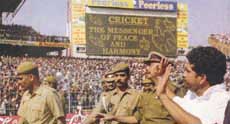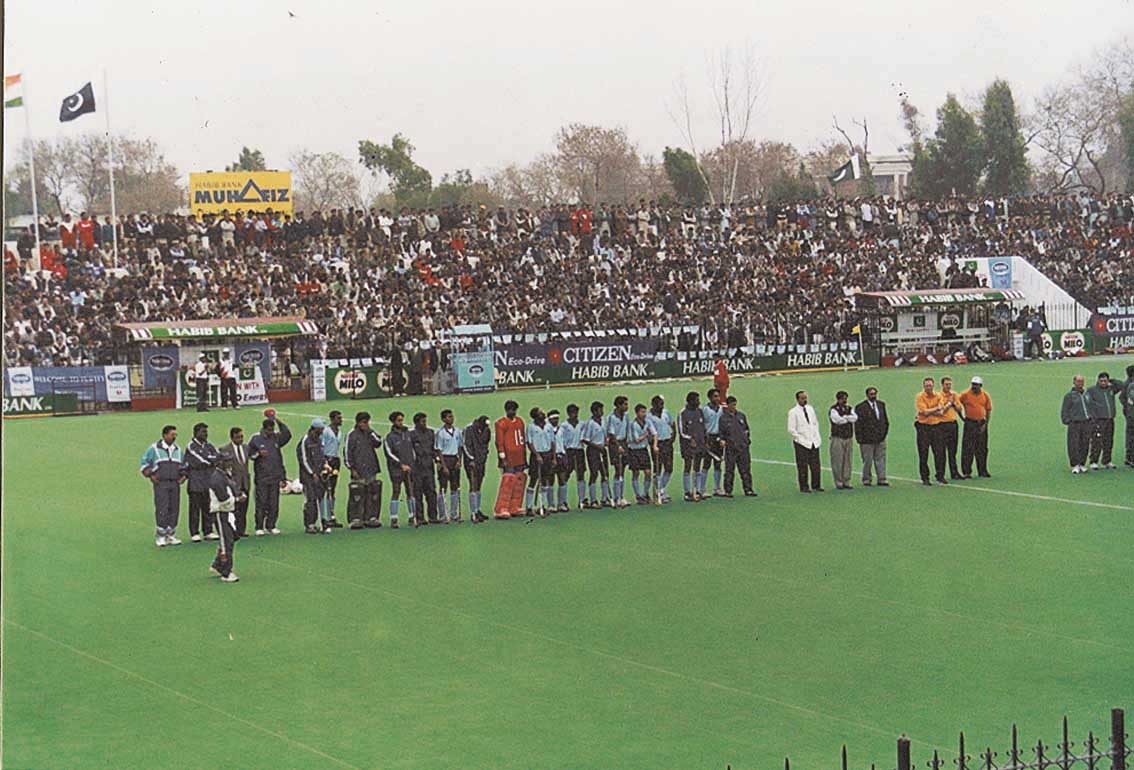Lessons from
Pakistan
By Amardeep
Bhattal
FEBRUARY 20, 1999, was indeed a day
of introspection for sports lovers of India and Pakistan
as the two countries clashed in cricket and hockey at
Calcutta and Peshawar, respectively. The two cities
linked by the Grand Trunk Road have very little in
common. The language, culture, religion, weather
and trade are different. The only bond connecting the two
was that of the avid following of sports-lovers, mostly
peace loving. Both the cities have produced international
stars, be it in cricket or hockey. While Saurav Ganguly
is the heart-throb of Calcutta, Shahid Afridi is the hero
of Peshawar. The capital of the North-West Frontier
Province has also produced outstanding hockey players
like Brig Abdul Hameed Hamidi, Syed Khan, Qazi Moheb,
Farat Khan, Mashood and Abdul Ismail, all of whom
represented Pakistan in the Olympics. The language, culture, religion, weather
and trade are different. The only bond connecting the two
was that of the avid following of sports-lovers, mostly
peace loving. Both the cities have produced international
stars, be it in cricket or hockey. While Saurav Ganguly
is the heart-throb of Calcutta, Shahid Afridi is the hero
of Peshawar. The capital of the North-West Frontier
Province has also produced outstanding hockey players
like Brig Abdul Hameed Hamidi, Syed Khan, Qazi Moheb,
Farat Khan, Mashood and Abdul Ismail, all of whom
represented Pakistan in the Olympics.
But on that fateful day,
while Calcutta’s sporting image was sullied beyond
redemption, Peshawar won accolades.
Having reached Peshawar a
night earlier for covering the seventh hockey Test
between the two countries the following day, I had
already got wind of the tension in Calcutta following
Sachin Tendulkar’s controversial run-out. The
following morning, which was the last day of the Asian
Test Championship tie between India and Pakistan at
Calcutta’s Eden Gardens, cricket was being hotly
discussed on the streets of Peshawar. The live coverage
of the match on television amidst sporadic gunfire,
possibly from AK-47s, added to the tension.
Nevertheless, as a
newsman, I preferred to take a stroll of Saddar Road
which leads to the Lala Ayub Hockey Stadium where the
seventh India-Pakistan hockey Test was scheduled to be
played that evening. At every nook and corner I was
accosted by enthusiastic Pashto speaking youngsters, who
seemed to be following the proceedings at Calcutta with
keen interest. The general refrain was that the Calcutta
crowd was least sporting. Syed Shahanshah Jilani, a
furniture salesman, had just been talking about the role
of cricket and hockey in improving relations between the
two countries when the owner of Kashmir Furniture butted
in. "Look what they are doing in Calcutta,"
said Mohammed Amin, in an exasperated tone in the typical
British accent.
 Gesturing
me to follow him, he turned the television screen towards
me for a first-hand account from Eden Gardens. And there
it was! The match had been temporarily halted as groups
of young men, with no sense of history, were engaged in
the common effort of subverting history. Wasim Akram and
his team-mates sat in the middle feeling somewhat relaxed
with a Pakistani victory very much in the air. And then
followed the bonfires and more missiles. With no let-up
in crowd voilence, the spectators were given marching
orders and the match completed in-camera, something
unheard of in the annals of sport history. Gesturing
me to follow him, he turned the television screen towards
me for a first-hand account from Eden Gardens. And there
it was! The match had been temporarily halted as groups
of young men, with no sense of history, were engaged in
the common effort of subverting history. Wasim Akram and
his team-mates sat in the middle feeling somewhat relaxed
with a Pakistani victory very much in the air. And then
followed the bonfires and more missiles. With no let-up
in crowd voilence, the spectators were given marching
orders and the match completed in-camera, something
unheard of in the annals of sport history.
"Is this behaviour
and violence justified?" asked Amin. "Your
players come here and go back with a bountiful of
affection. Look what our players are getting —
missiles and abuses," he said.
Moving towards the hockey
stadium, we could sense that the people in general were
rather friendly. Inside the stadium it was again a jovial
mood as the jam-packed crowd eagerly awaited for the
action to commence. And when the proceedings did finally
begin on schedule on the hockey turf in the backdrop of
the Jamraud hills, every single move from either side was
applauded. However, in a crowd of several thousand, a few
mischief mongers are bound to be present, who can only
thrive on public support. But if such support is not
forthcoming, they are also forced to bow before public
sentiments. Thus when the odd bottle thrower gave vent to
his feelings after Pakistan were trailing 1-2, a mild
appeal by Pakistani skipper Atif Bashir to maintain calm
was enough to restore order. The organisers also kept
reminding the gathering of the Pathan hospitality and the
region’s age-old tradition of honouring guests,
which had the desired effect.
At the end of the contest
incidentally won by India, there were hardly any bitter
feelings. Many people in fact came to congratulate us for
the Indian team’s fine showing after earlier
setbacks.
Even personnel manning the
camp office of the Post and Telegraph Department in the
stadium, while appreciating the display by the Indian
hockey team, were remorseful over the happenings in
Calcutta. The forced exit of spectators at Eden Gardens
seemed to be weighing on their minds. "Why should
such an eventuality arise when sport is a means to bring
the two countries closer," they asked us.
There were others who felt
that a sporting gesture like recall of Sachin Tendulkar
by Pakistan skipper Wasim Akram after the controversial
run-out could have strengthened the bond of friendship.
After all, it was the Friendship Series. Some even cursed
Akram for his interest in clinching the rubber.
"Victory at the cost of friendship is most
undesirable," said an old Pathan as we prepared to
leave the place after filing our stories.
It was the same story at
Rawalpindi, the venue of the eighth hockey Test, two days
later. Tariq Mahmood and Mohammed Yousuf, members of the
local Young Brothers Hockey Club, were unanimous in
saying that they had forgotten the Calcutta episode.
"We are here to enjoy good hockey. You will see that
all good moves by the players are appreciated," they
said. And so they were at Army Stadium as India and
Pakistan dished out an exciting fare in Asian style.
Talib Bokhari, Director,
Schools, Rawalpindi, who was sitting beside me during the
encounter, revealed that Pakistanis in general were happy
when India won the gold during the Asian Games.
"After all we are part of the same
subcontinent," he said. Bokhari’s views stood
vindicated when the maximum cheers were reserved for the
Indian team for the gallant fightback at Rawalpindi. This
was besides the standing ovation which Bhaskaran’s
boys received at the end of the gruelling tie.
Lahore was a similar
experience. Calcutta had been long forgotten and hopes of
another exciting hockey Test drove thousands of
spectators to the National Hockey Stadium, venue of the
Champions Trophy last year. Here again the visitors were
lustily cheered and the Indian victory hardly caused any
heart-burning. Prime Minister Nawaz Sharif himself drove
down to the stadium to cheer the players and it was
indeed a pleasant sight seeing him mingle with the
spectators.
Later, as the Indian
players, officials and scribes joined their Pakistani
counterparts on the dance floor of Pearl Continental, the
two coaches — Vasudevan Bhaskaran and Shahnaz Sheikh
— dancing hand-in-hand to "Yehi dosti
hai..." a popular number, further cemented the
feeling of oneness between the peoples.
Do Peshawar, Rawalpindi
and Lahore hold a lesson for Calcutta?
|

